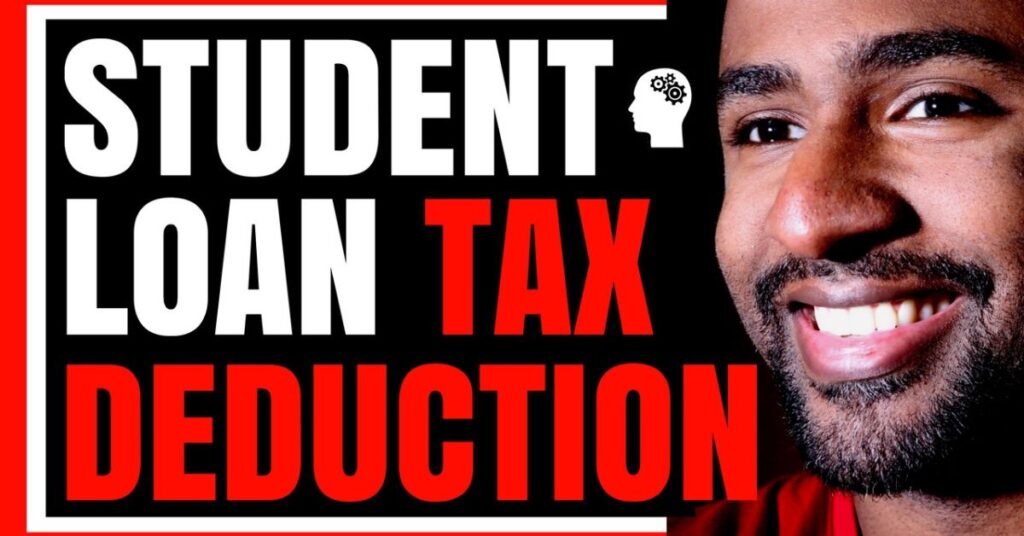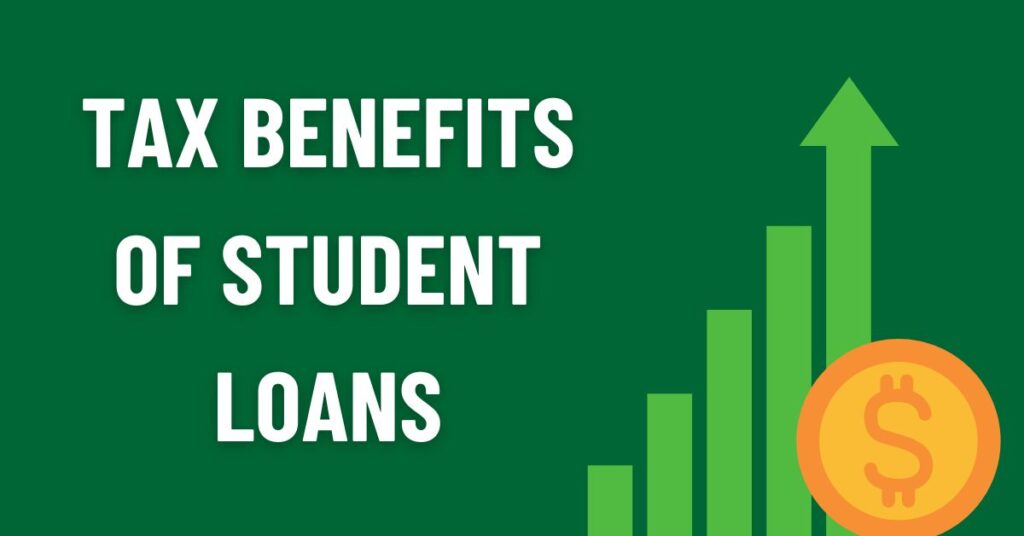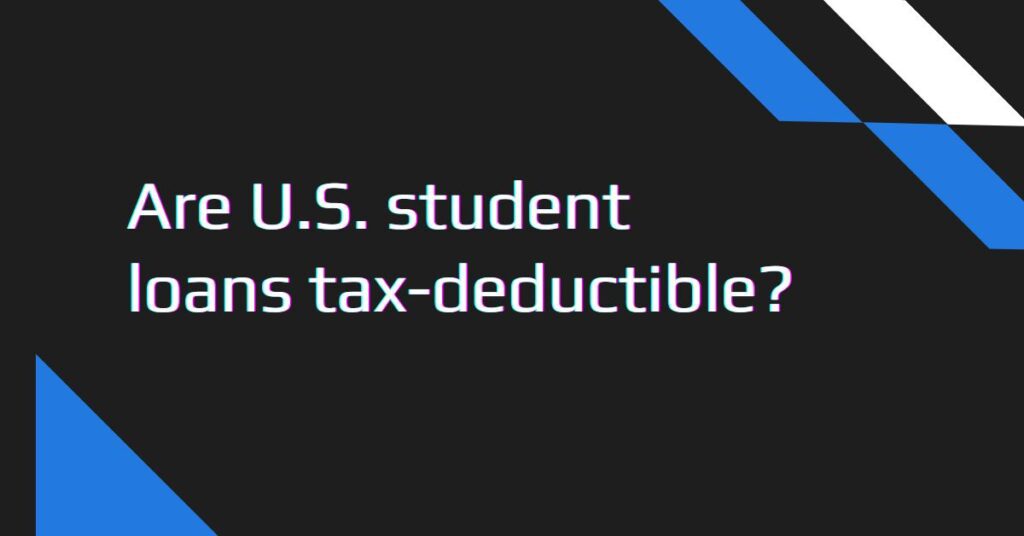Physical Address
304 North Cardinal St.
Dorchester Center, MA 02124

Understanding how to manage student loans effectively is crucial for millions of Americans burdened with educational debt. While repaying these loans can be financially challenging, there are tax benefits that can ease this burden. One common question is: Are student loans tax-deductible? This article will explore the tax deductions related to student loans and provide insights on how to optimize your tax return.
Tax deductions are expenses that can be subtracted from your taxable income, reducing the amount of tax you owe. In the context of student loans, certain educational expenses and interest payments may qualify for tax deductions, allowing you to lower your overall tax liability.
Education-related tax deductions include the student loan deduction, lifetime learning credit, and tuition and fees deduction. Each has specific eligibility criteria and benefits that we’ll explore further.

The Student Loan Interest Deduction allows you to deduct up to $2,500 of the interest paid on qualified student loans from your taxable income. This deduction is available even if you don’t itemize your deductions, making it accessible to many taxpayers.
To qualify for the Student Loan Interest Deduction, the loan must have been taken out solely for qualified education expenses for you, your spouse, or a dependent. Additionally, your modified adjusted gross income (MAGI) must fall below the annual limit set by the IRS.
You can deduct the lesser of $2,500 or the actual amount of interest you paid during the year. The exact amount you can deduct may be reduced if your MAGI exceeds a certain threshold.
To claim the Student Loan Interest Deduction, you’ll need to use Form 1040 or Form 1040A and provide information from Form 1098-E, which your loan servicer should send to you. Be sure to double-check all figures to avoid errors.
The lifetime learning credit offers up to $2,000 per tax return for qualified education expenses. Unlike the American Opportunity Tax Credit, there’s no limit to the number of years you can claim it, making it ideal for lifelong learners.
The American Opportunity Tax Credit provides up to $2,500 per eligible student for the first four years of higher education. This credit can reduce your tax bill on a dollar-for-dollar basis, making it one of the most valuable education tax benefits.
The Tuition and Fees Deduction allows you to deduct up to $4,000 of qualified education expenses from your taxable income. This deduction is available even if you don’t itemize, but it may not be combined with the lifetime learning credit.
In certain cases, forgiven student loans are considered taxable income. This means that the amount forgiven could increase your tax bill. Common situations where forgiveness may be taxable include income-driven repayment plans and private loan settlements.
There are exceptions where forgiven student loans are not taxable, such as the Public Service Loan Forgiveness (PSLF) program and forgiveness due to disability or death. It’s essential to understand these exceptions to avoid unexpected tax liabilities.
Form 1098-E reports the amount of interest you paid on your student loans during the year. You’ll need this form to claim the student loan deduction. Ensure that all the information is accurate and matches your records.
Common mistakes when filing taxes with student loans include missing the deadline to claim deductions, not understanding eligibility criteria, and failing to keep proper documentation. Avoiding these mistakes can save you money and stress.
To maximize your tax return, consider all available education tax benefits, including deductions and credits. If you’re unsure which to claim, consult with a tax professional to ensure you’re getting the most out of your tax situation.

A recent graduate with $30,000 in student loans pays $1,200 in interest during the year. By claiming the student loan interest deduction, they can reduce their taxable income by $1,200, potentially saving hundreds of dollars on their tax bill.
A parent paying for their child’s college education may qualify for the American Opportunity Tax Credit, reducing their tax liability by up to $2,500. This can significantly offset the cost of higher education.
One common myth is that all student loan payments are tax-deductible. In reality, only the interest portion may qualify, and there are income limits that may affect eligibility.
Complex scenarios, such as loans for mixed-use purposes or refinancing, can complicate the ability to claim deductions. It’s essential to clarify these situations to ensure you’re taking advantage of the correct tax benefits.
As student loan debt continues to grow, legislative changes could impact the tax treatment of student loans. Stay informed about potential reforms that could affect your tax strategy.
Future tax seasons may bring changes to the eligibility criteria for deductions and credits or the introduction of new tax benefits. Keeping up-to-date with these trends can help you plan your finances effectively.
Financial advisors emphasize the importance of understanding all available tax benefits when managing student loans. “Maximizing tax deductions and credits can significantly reduce the financial burden of student loans,” says Jane Doe, a certified financial planner.
Integrating tax deductions into your financial planning can help you manage debt more effectively. Consider working with a financial advisor to develop a strategy that aligns with your long-term goals.

If you’re one of the millions of Americans with student loans, you might be wondering if there’s any relief when tax season rolls around. The good news is that certain tax benefits can help ease the financial burden of repaying student loans. One of the most common questions is whether student loans themselves are tax-deductible. This article will explore that question and provide detailed insights into the tax benefits associated with student loans.
Student loan interest is the cost you pay for borrowing money to finance your education. When you take out a student loan, you agree to repay the amount borrowed (the principal) plus interest over time. Interest is calculated based on the principal balance of the loan and accrues daily, meaning it compounds over time if not paid regularly.
For most federal student loans, interest accrues while you are in school, though you may not have to make payments until after graduation. However, some loans, like unsubsidized federal loans and private loans, accrue interest during school, which may be added to your loan balance if not paid.
The primary income tax benefit related to student loans is the Student Loan Interest Deduction. This deduction allows you to reduce your taxable income by up to $2,500 for interest paid on qualified student loans. By lowering your taxable income, you effectively reduce the amount of income tax you owe.
The Student Loan Interest Deduction is a tax benefit that allows you to deduct up to $2,500 of student loan interest from your taxable income each year. This deduction is available to taxpayers who meet specific criteria and is intended to ease the financial burden of repaying student loans.
Yes, you can deduct student loan interest on Form 1040. To claim this deduction, you need to complete Schedule 1 (Form 1040). On this form, you will report the amount of interest paid on your student loans in the section for “Adjustments to Income.” This deduction reduces your taxable income, which can result in a lower tax liability.
There seems to be some confusion here. The percentage mentioned relates to your tax bracket, not your eligibility to claim student loan interest. The student loan interest deduction is not affected by your tax bracket but by the amount of interest you’ve paid and whether you meet the income eligibility requirements.
The student loan interest deduction worksheet for 2023 is a tool provided in IRS Publication 970. This worksheet helps you determine the amount of student loan interest you can deduct based on your total interest paid and income level. You can find this worksheet online through the IRS website or use tax preparation software that includes these calculations.

To claim student loan interest on your taxes, follow these steps:
Yes, interest paid on student loans is tax-deductible up to $2,500 per year, provided you meet the eligibility criteria. This deduction can reduce your taxable income and, consequently, your tax liability.
You do not need to claim the principal of student loans on your taxes, but you should report the interest paid to benefit from the deduction. Claiming the interest paid can lower your taxable income, which can be a significant financial advantage.
The Student Loan Interest Deduction works by allowing you to subtract up to $2,500 of interest paid on qualified student loans from your taxable income. This adjustment reduces your taxable income, which can lower the amount of tax you owe. The deduction phases out if your income exceeds certain thresholds.
For additional assistance with student loan tax deductions, consider the following resources:
Understanding how student loan interest works and leveraging available tax benefits can help you manage your finances more effectively. By staying informed and utilizing available resources, you can ease the financial burden of student loan repayment and maximize your tax savings.
Managing student loans can be challenging, but understanding the tax benefits available can make a significant difference. By taking advantage of deductions like the Student Loan Interest Deduction and credits like the American Opportunity Tax Credit, you can reduce your tax burden and make repaying your loans more manageable. Stay informed about potential changes in tax laws and consult with a tax professional to ensure you’re maximizing your benefits.
the phase-out limits, and keep abreast of any changes in tax laws that might affect your ability to claim this deduction.
No, the student loan interest deduction can only be claimed after you start repaying the loan, which typically begins after graduation.
Saqib Hussain, the mastermind behind the thought-provoking WORLD NEWS, is a prolific author renowned for his insightful exploration of news, artificial intelligence, finance, science, and technology. Graduating with a master’s degree in creative writing from Oxford University, saqib Hussain’s educational background shines through in his meticulously crafted prose.
Hussain’s unique blend of in-depth research and keen observation sets him apart in the literary world. His passion for books, technology, finance, and artificial intelligence infuses his writing with depth and clarity that captivates readers from all walks of life. Beyond his literary pursuits, Hussain finds inspiration in sports, entertainment, and the ever-evolving landscape of technology.
Through his writing, Hussain sheds light on crucial issues shaping our world today, offering a fresh perspective that challenges readers to think critically. With an unwavering commitment to excellence and a profound understanding of his craft, Saqib Hussain continues to shape the narrative of our time, leaving a lasting impact on those who delve into his compelling works.